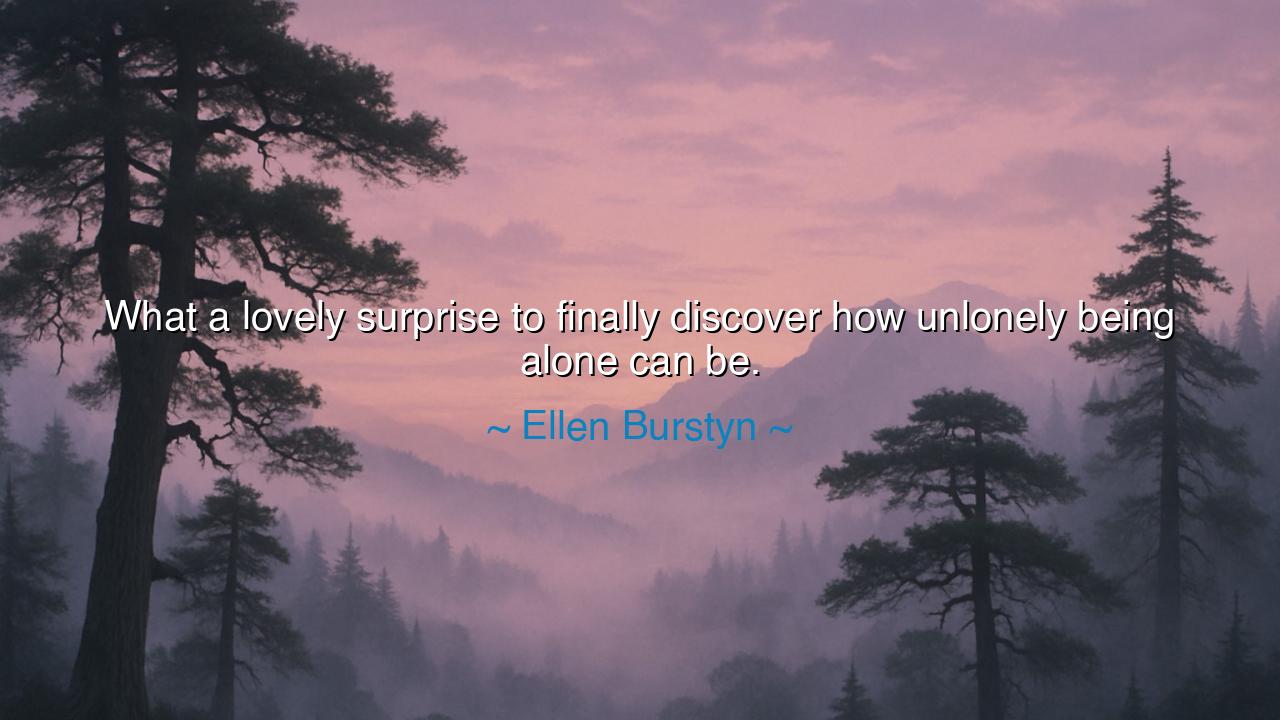
What a lovely surprise to finally discover how unlonely being






“What a lovely surprise to finally discover how unlonely being alone can be.”
Thus spoke Ellen Burstyn, an actress whose life and art have been woven with both joy and solitude. In these gentle words lies a revelation both tender and profound — the moment when the heart, long fearing silence, awakens to its beauty. To be alone and not lonely is a triumph of the spirit, a mark of maturity that few ever reach. It is the moment when one no longer runs from the self, but walks toward it — and in that meeting, finds peace. Burstyn’s reflection is not the sigh of resignation, but the song of discovery: that within the quiet of solitude lives not emptiness, but abundance.
For much of life, people are taught to fear solitude — to fill every silence with noise, every stillness with company. We mistake aloneness for absence, and loneliness for failure. Yet Ellen Burstyn’s words reveal the secret known to sages and mystics across the ages: that when one dares to dwell in solitude without resistance, something miraculous happens. The heart, no longer seeking validation from without, begins to draw strength from within. The mind, once restless, learns the rhythm of stillness. The soul, once shadowed by longing, discovers that it was never truly alone — for it has always been in the company of itself, and of the eternal.
The ancients, too, knew this truth well. Marcus Aurelius, emperor and philosopher, ruled over vast armies and lands, yet wrote in his Meditations that the soul must retreat into itself as often as possible, for there it finds “a tranquility not to be found elsewhere.” Likewise, Ellen Burstyn, in the modern age of chaos and constant noise, discovered in solitude the same quiet kingdom that the ancients called sacred. What she calls a “lovely surprise” is the same awakening that the hermits of old sought in their caves and temples: the discovery that to be alone is not to be forsaken, but to be free.
Consider also the story of Eleanor Roosevelt, who in her youth was painfully shy and often lonely. Yet through years of reflection and service, she grew into a woman of immense inner power. When asked once about loneliness, she said, “You must do the thing you think you cannot do.” She had learned, like Burstyn, that courage in solitude transforms emptiness into empowerment. Alone, she forged her conscience, her vision, and her voice — and from that strength came compassion for others. Such is the paradox of solitude: the more deeply you enter it, the more connected you become to life itself.
To be unlonely while alone is to have made peace with one’s own company. It means that the self is no longer an enemy to escape, but a friend to embrace. It is a state of grace reached not by accident, but through the patient work of reflection and acceptance. One must first face the discomfort of silence, the fear of one’s own thoughts, before discovering the richness that lies beneath. Loneliness is not cured by company, but by communion — communion with the self, the universe, the unseen harmony that breathes through all things.
Yet this awakening is not without its trials. In the beginning, solitude may feel heavy; it confronts us with what we have long avoided — our regrets, our longings, our unfinished dreams. But if we stay, if we listen, solitude becomes a teacher. It sharpens perception, deepens gratitude, and reveals that beauty has always been near. The “lovely surprise” Burstyn speaks of is the moment this transformation occurs: when the fear of being alone melts into wonder, and we see that the same stillness we once fled now welcomes us home.
The lesson of her words, then, is clear: do not flee from solitude — befriend it. When life grows loud, step away and listen to your own heartbeat. Sit beneath the sky without distraction; feel the peace that requires no witness. Speak kindly to yourself in those quiet hours, and you will discover what Burstyn found — that your own company can be enough. The world rushes by, but the soul moves slowly; only in stillness can you meet it.
So, my child of the future, remember this: being alone is not the same as being lonely. To be alone is to return to the source of your strength, to drink from the inner spring that never runs dry. Do not fill your silence with noise; fill it with presence. And when you, too, one day awaken to this truth, it will come as a “lovely surprise” — that you were never empty, never abandoned, never lesser for your solitude. You were, all along, whole.






AAdministratorAdministrator
Welcome, honored guests. Please leave a comment, we will respond soon